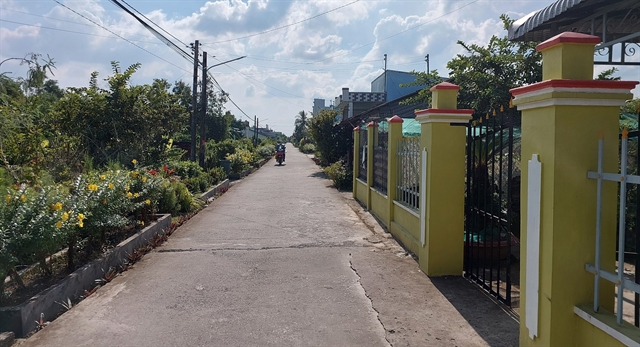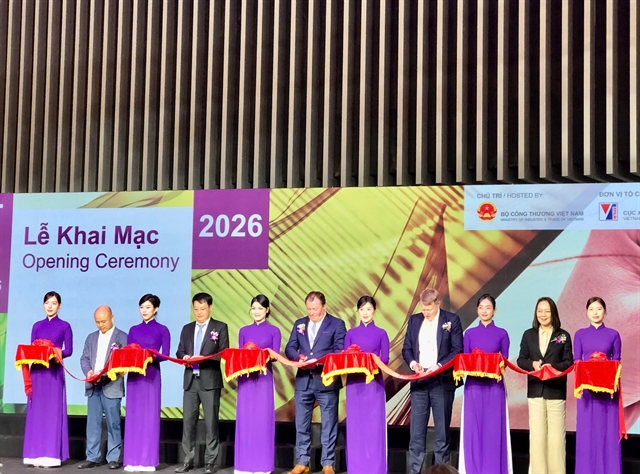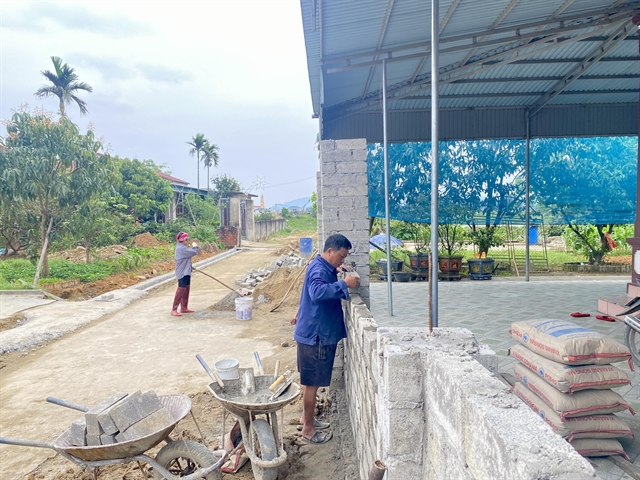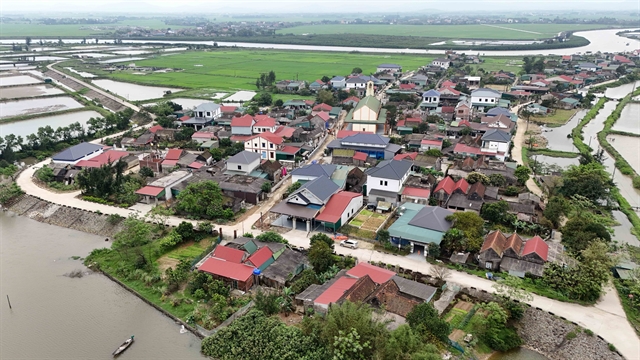 Society
Society

 |
| A household in Vĩnh Phúc Village of Hà Tĩnh Province voluntarily uninstall its fence for road building. VNA/VNS Photo |
HÀ TĨNH – Embracing the spirit of 'living well, living your faith', dozens of households in the Catholic village of Vĩnh Phúc in Hà Tĩnh Province have sacrificed personal interests, donating land and assets worth billions of đồng to widen local roads.
Thanks to these efforts, the local transport infrastructure is gradually being improved, helping Vĩnh Phúc Village meet the targets of a model new-style rural residential area.
Pioneers
In response to the national movement of unity, since late last month, Vĩnh Phúc Village has been filled with the sounds of machinery dismantling structures like fences and gates.
Dozens of households have voluntarily donated land and relocated assets to help widen roads.
Phạm Thị Chúc, 60, was among the first to donate land. Although her property was not included in the first clearance phase, she voluntarily dismantled her fence, gate columns and canopy to support the effort.
Chúc said that the road was originally quite narrow, making travel difficult now that many families own cars.
“When the village authorities called for land donations to widen the road, my family readily supported the plan,” said Chúc.
As her plot borders two roads, she donated over 70sq.m of land and removed structures like fences and a canopy.
 |
| A villager rebuilds his fence after donating land for road construction. VNA/VNS Photo |
Nguyễn Văn Thường’s family donated nearly 100sq.m of land and 53m of fencing.
With land in the area priced at around VNĐ2 million (US$80) per square metre, his family’s contribution is estimated at over VNĐ200 million ($8,000).
Thường said that once the roads were completed and widened, travel would be easier and the local economy would benefit.
“Now that the country enjoys peace, political stability and growing prosperity — with children receiving proper education — I want to contribute to making the homeland richer and more beautiful,” said Trường.
These pioneers inspired others and the land donation movement in Vĩnh Phúc Village quickly gained momentum.
Notably, Lê Thị Hà, 30, had built a fence and gate worth nearly VNĐ100 million ($4,000) just three months earlier, but when local authorities mobilised support, her family voluntarily dismantled it to make way for a new road leading into their yard.
Hà said that after dismantling the structures, they had to hire workers to rebuild them. Despite the cost being doubled, the family was happy because the road in front of their home was widened from three metres to over five.
Transforming the village landscape
 |
| Vĩnh Phúc Village strives to meet new rural criteria. VNA/VNS Photo |
As of early this year, 43 households in the village have voluntarily donated more than 1,500sq.m of land, 1,500m of fencing, hundreds of gate columns, and hundreds of trees.
The total value of land and property donated for the new-style rural construction is estimated at over VNĐ3.5 billion ($140,000).
Along with this, the Vĩnh Phúc Village Fatherland Front Working Committee cleared 1.5km of road space.
Roads that were once only two or three metres wide are now a minimum of five in hamlets, meeting the standards for new-style rural construction.
Trần Xuân Lý, head of Vĩnh Phúc Village, said the village has over 400 households and 1,600 residents, all of whom are Catholic.
Previously, roads were so narrow that only one vehicle could pass through.
So the village held meetings to discuss the road expansion initiative. Once people saw the plan was reasonable, they strongly supported it, Lý said.
However, some households were initially reluctant. Some felt they had already donated land before and found it unfair to be asked again.
For those still hesitant, the village persisted in campaigning and also sought the support of the local parish priest.
After witnessing the improvements in widened roads and the transformed village appearance, many of the hesitant households came on board. Some even urged local authorities to expand adjacent roads for consistency, he said.
The plan is for Vĩnh Phúc Village to meet the criteria of a model new-style rural residential area by May 2025.
Along with land donation campaigns, local authorities are focusing on other targets like environmental sanitation, upgrading auxiliary buildings, and planting trees.
Nguyễn Văn Quỳnh, Party cell secretary of Vĩnh Phúc Village, said the Fatherland Front Working Committee was continuing to mobilise the remaining hamlets to donate land for further road widening. The plan is to expand another 1km of village roads.
The unity and contributions of Vĩnh Phúc residents are playing a major role in the model rural development of Nam Phúc Thăng Commune.
Nguyễn Hữu Tú, permanent deputy secretary of the Nam Phúc Thăng Commune Party Committee, said Vĩnh Phúc is the most populous and largest village in the commune.
In previous years, due to limited land and a dense population, land donation campaigns failed. Now, with people’s support, many roads had been expanded, Tú said.
The local Catholic community had become an exemplary force in building new-style rural areas, demonstrating unity and living out the ideal of 'living well, living your faith', he added. VNS




